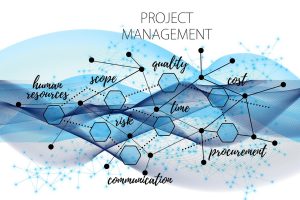
Artificial intelligence (AI) is rapidly transforming how we plan, execute, and monitor projects, promising a future of streamlined workflows and maximized efficiency. We can now think of AI as an efficient assistant skilled in analyzing data, identifying trends, and offering advice on next steps.
Let’s delve into some recent trends and best practices in AI project management. We will explore the exciting possibilities and the challenges that come with this innovation.
Emerging Trends in AI Project Management:
Automated Scheduling & Resource Allocation: AI algorithms can be used to analyze historical data and project requirements to create optimized project schedules and allocate resources more effectively. This would free up project managers from time-consuming tasks and allow them to focus on strategic decision-making.
Predictive Analytics & Risk Management: By analyzing vast amounts of data, AI can identify potential risks and predict project bottlenecks before they occur. This proactive approach will allow project managers to take preventive measures and ensure projects stay on track.
Real-Time Progress Monitoring & Collaboration: AI-powered tools can provide real-time insights into project progress, team performance, and potential roadblocks. This will enable improved communication and collaboration among team members and stakeholders.
Intelligent Task Management & Automation: AI can automate repetitive tasks such as data entry, report generation, and progress updates. This will not only save time but will also minimizes human error, leading to improved project accuracy.
AI-powered Communication Assistants: Chatbots and virtual assistants powered by AI can answer team queries, provide project updates, and schedule meetings. This will streamline communication and free project managers from administrative tasks.
What are some Best Practices for Implementing AI Effectively:
Clear Goals & Defined Scope: Clearly define the project goals and scope before implementing any AI tools. Ensure AI is used to augment human expertise and not replace it.
Data Quality & Governance: High-quality, unbiased data is crucial for effective AI implementation. Establishing data governance policies will ensure responsible data collection, storage, and use.
Change Management Strategy: Implementing AI can lead to change anxiety among team members. Develop a change management strategy to address any concerns and to encourage adoption.
Human Oversight & Explainability: Maintaining human oversight in critical decision-making processes is key. Invest in explainable AI (XAI) techniques to understand how AI arrives at conclusions, fostering trust and transparency.
Continuous Learning & Improvement: AI is constantly evolving we need to embrace continuous learning and stay updated on the latest AI advancements to optimize project management practices.
What are some Challenges and Strategies with AI:
Ethical Considerations: Bias in AI algorithms can lead to unfair outcomes. Focusing on using AI tools that are ethically developed can help to mitigate algorithmic bias.
Technical Expertise & Talent Gap: Effectively utilizing AI requires a new skillset. Investing in training the project team or considering working with AI specialists will help to address this.
Integration Challenges: Integrating AI tools with existing project management systems can be complex. Carefully evaluate compatibility and ensure smooth data flow.
By embracing AI and implementing it strategically, project managers can unlock a future of streamlined workflows, improved decision-making, and superior project outcomes. However, remaining aware of the challenges and ensuring responsible AI use is crucial for maximizing the benefits of this transformative technology.
